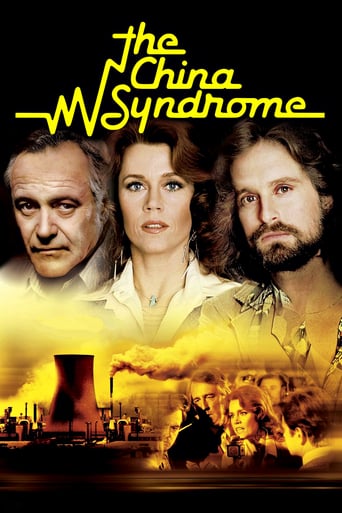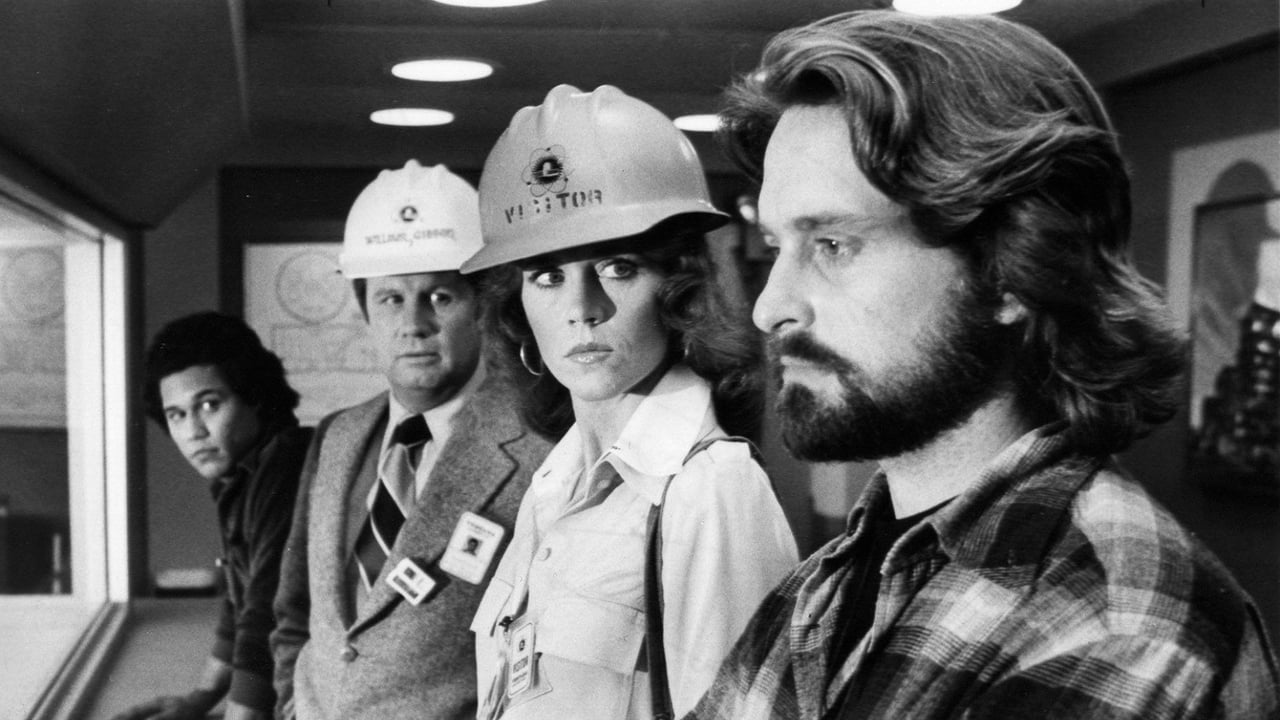joeflemming
The China syndrome starts with a bang- Jane Fonda and Michael Douglas are at a nuclear power plant when something goes wrong and they manage to capture it on camera. What follows is an investigation into the cover ups that ensues to make sure there is no panic. All the actors are very good here- Douglas and Fonda as the determined young reporters, Jack lemmon as the shift supervisor who unfortunately gets the blame. The pacing is great and the opening scene with the meltdown are genuinely terrifying.
James Hitchcock
Despite the rather silly title, "The China Syndrome" has nothing to do with China. Nor, for that matter, has it anything to do with a "syndrome" in the medical sense. The title refers to the fanciful idea that a nuclear meltdown might result in the reactor melting its way through the Earth and emerging in China. The story concerns a "near-miss" accident at a nuclear power plant which nearly results in such a meltdown, although the staff narrowly manage to bring the situation under control. The incident, however, has been witnessed by Kimberly Wells, a television news reporter visiting the plant on a routine assignment, and by her cameraman and soundman. Moreover the cameraman, Richard Adams, has surreptitiously captured the whole incident on film.The three main characters in the film are Kimberley, Adams and Jack Godell, a senior manager at the plant. Kimberley is a young and inexperienced reporter, chiefly employed by the station to report on bland, uncontroversial "human interest" stories, and with no background in investigative journalism. Jane Fonda, the actress who plays her, would have been 42 in 1979 but looked at least a decade younger. The Christian name "Kimberley", unusual for an American woman of Fonda's generation, may have been deliberately chosen to suggest a younger person. At first she is happy to go along with her station bosses who want to cover up the incriminating footage because Adams was acting illegally by filming inside the plant. Later, however, she changes her stance when she realises the massive implications of what she has witnessed.Adams's radical politics and counter-culture credentials are emphasised by his then-fashionable long hair and beard. (He is played by the normally clean-cut, clean-shaven Michael Douglas). He wants to go public with the incriminating evidence from the start and has little sympathy with what he sees as Kimberley's temporising, possibly because he is a freelance rather than an employee of the station and therefore has less to lose than her.Godell is perhaps the most interesting of the three. He is in late middle age and has always been a loyal employee of the company. He has an expert knowledge of the nuclear industry, and is the man chiefly responsible for averting the threatened crisis. When he realises, however, that the employers to whom he has dedicated his life are taking serious risks with public safety, he determines to expose them, even though he knows he will be putting himself in danger by doing so. The company, like the bad guys in all thrillers of this sort, will do anything, up to and including murder, to silence their critics. (Hector, Kimberley's soundman, is seriously injured when his car is forced off the road in an attempt to kill him). Desperate to ensure that the truth is known, Godell is forced to take the drastic step which forms the central incident of the film.Fonda was a favourite daughter of the Academy in the late seventies. She won the "Best Actress" Oscar for "Coming Home" in 1978 and was nominated for "Julia" in 1977 and for this film in 1979. Interestingly, all three roles reflect her own left-wing political beliefs; she was not nominated for any films from this period (such as "California Suite") which lack an obvious political sub-text. The Academy obviously had no hard feelings about her controversial visit to Hanoi earlier in the decade, although some sections of American public opinion were to be less forgiving.Whatever one may think of her politics, however, Fonda is certainly good here- better, in my opinion, than she had been in the dull and overrated "Coming Home" or the intellectually dishonest "Julia". She is able to bring out the way in which her character develops emotionally and spiritually. Kimberley is initially a rather naive young woman, happy to go along with her bosses rather patronising view of her as the pretty public face of broadcast news. With a public role, however, come public responsibilities, and Kimberley gradually realises that she has a duty to tell the truth, even if (or especially if) someone else would prefer that truth to remain untold. The other excellent performance comes from Jack Lemmon (also Oscar-nominated) as the desperate Godell.The film reflects the post-Watergate mood in America that those in authority were not to be trusted. It gave rise to a number of similar thrillers, such as "Silkwood" (based on a true story), "The Pelican Brief" and "Chain Reaction", in which intrepid investigators tangle with a gang of corporate villains who are trying to cover up the fact that they have been playing fast-and-loose with public safety or otherwise acting in a manner detrimental to the public interest. It also marks a shift in the way nuclear power was perceived during the seventies. During the fifties and sixties it was regularly cited as the prime example of how science could be used for either good or evil; ban-the-bomb campaigners were careful to stress that they opposed the military, but not the peaceful, applications of atomic power. The seventies, however, saw the growth of an overarching anti-nuclear movement which campaigned not only against nuclear weapons but also against civilian nuclear power.Upon its first release on 16th March 1979, "The China Syndrome" was, predictably, rubbished by the nuclear industry, which claimed that the events portrayed were pure fantasy. And then, on 28th March, came the nuclear accident at Three Mile Island. The film suddenly started to look prescient rather than fantastic; its box-office success was assured. It began to look more prescient still when the much more serious Chernobyl accident occurred a few years later. And, in the light of the Fukushima disaster of 2011, public concerns about nuclear power still have not gone away, nearly forty years after the film was made. 7/10
dougdoepke
No need to recap the plot, nor echo consensus points on the excellence of the production. Instead, I want to single out three topical threads that drive much of the drama and remain relevant in our own day.One thread is the shaping of public consciousness by mainstream media. The conflict here is between a breaking crisis at a nuclear power plant and how that gets reported, if at all. Understandably, Godell (Lemmon) and allies feel that ordinary cautions about law-suits and bureaucratic procedures must be overridden in order to prevent the plant from starting up again and risking apocalypse. On other hand, Well's (Fonda) TV station must concern itself with risking major liability if Godell turns out to be a crank, which the power company is insisting upon. So where does the station's responsibility lie. In the movie there's little time to sort out these concerns, so the station's honchos must make snap decisions.Another thread is the conflict between personal conscience and practical concerns. Godell is a central figure here, along with reporter Wells. Godell loves the plant and the services it provides. On other hand, he must wrestle with growing realization that the plant's safety features are fatally flawed. Thus he moves through stages of personal involvement until finally engaging whole-heartedly in exposing the dangers to a TV audience. Similarly, Wells moves through stages from cushy denial to putting her job and life on the line in support of Godell going on TV. But can Godell be so certain of his conclusion. There's no time to verify since the power company insists on starting up again.And lastly is the question of power itself, both literally and figuratively. Power, considered literally amounts to electricity to run our many modern conveniences (the movie's microwave oven), generated here by the nuclear power plant. Shutting it down would also mean shutting down an entire community including the TV station. Figuratively, the leverage amounts to who ultimately wields power within the society itself. We see elements of this crucial question revealed by the basic conflict over whether the plant is shut down or not. To me, the contest here is between an element of the 70's counter-culture, the bearded Richard (Douglas), along with in-betweeners like Wells and Spindler (Brimley), and the suits concerned foremost with company investments, especially the planned new plant up the coast. Note how the imperious board-chairman (Herd) peers down from above into the control room where the action is. Note too how he commands an armed security attack force, a lethal arm of corporate power where the power really is. Thus, I can't help but see elements of 60's counter-culture helping to shape this 1978 production. However, these echoes shouldn't be allowed to consign the perennial threads to a bygone time. Fashions may have changed, along with a new digital age that's loosened MSM's grip on public information. Still, these underlying threads, so powerfully dramatized in the film, remain among the underlying conflicts of our own age. For example, apocalyptic climate change is controversial, emerging as both an individual and collective issue. All in all, the movie amounts to a harrowing interweaving of such basic themes, thanks to a stellar cast, screenplay, and production crew. So don't miss it.
blanche-2
I saw "The China Syndrome" in the movie theater when it came out. By the time I saw it, Three Mile Island had already happened, and people were hyperaware of the dangers of nuclear power. Back then, it seemed it was always in the news, and this continued heavily into the mid-'80s. Despite accidents as late as 2014, we haven't had one in the U.S. in a long time, so it's not as prominent in the news. Now it seems to be fracking.The China Syndrome concerns a nuclear accident that almost happened, and the attempts to trivialize it. Jane Fonda plays reporter Kimberly Wells, who does light news but is at the plant the day where there seems to be kind of disturbance in the plant room. Her cameraman, Richard Adams, played by Michael Douglas, surreptitiously films the goings-on. As one of the plant workers, played by Jack Lemmon, investigates, he realizes the problem goes deeper than initially believed.The news station refuses to allow Kimberly to show the film and puts it in a safe, where it is stolen by Richard, who thinks everyone at the station, including Kimberly, is a wimp. Pretty soon, the nuclear people are anxious to get the news people to keep their mouths shut.The China Syndrome is an excellent film all around, including the acting, directing by James Bridges, and the editing. Nuclear power still exists, there are still accidents, and this film remains still relevant.



 AD
AD










